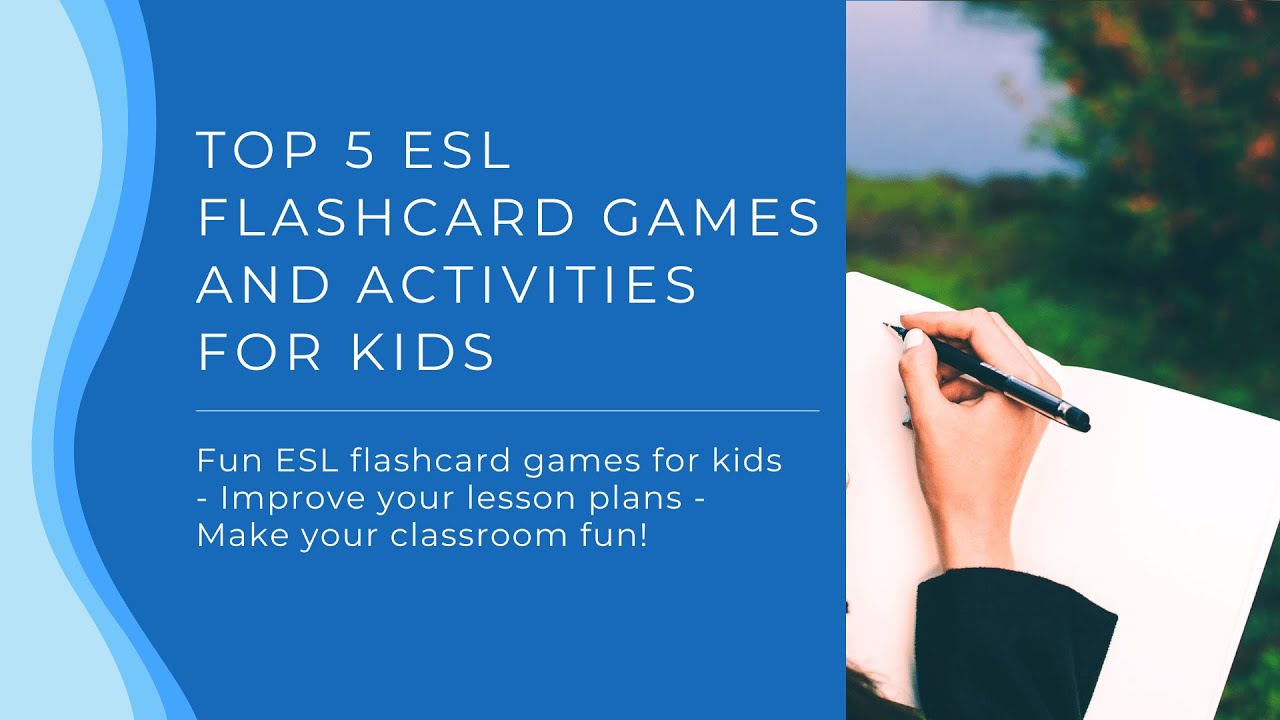
Top 5 ESL Flashcard Games and Activities for Kids | Fun Idea...
53K views · Nov 23, 2022 eslactivity.org
Flashcard games are a great activity for children learning ESL! Flashcards get your students active and help them learn while having fun. Check out my video on ESL flashcard games and activities, and bring them to life in your own classroom! --------------------- Find out how to teach children new words in English https://www.youtube.com/watch?v=3PL0XYG_OJ8& --------------------- Want to find out more? Check out: https://www.eslactivity.org/esl-flashcard-games/ 39 No-Prep/Low-Prep ESL Speaking Activities for Kids: https://amzn.to/3vZO18Y https://www.facebook.com/eslspeaking https://www.pinterest.ca/eslspeaking/ #flashcards #teachingenglishwithjackie #flashcards_for_kids #flashcardsforkids #teachingenglishabroad ---------------------- Even more Ideas for the TEFL Classroom: https://eslspeaking.org/ -------------------- More TEFL flashcard ideas from @Andy - The ESL Guy : https://www.youtube.com/watch?v=nxYpHhndRQU -------------------- Timestamps 0:00 Intro 0:32 Concentration 1:17 Flashcard questions 1:51 Yes/no questions with a partner 2:17 Secret word 3:00 20 questions 3:42 Conclusion Transcript for ESL flashcards games and activities: It's Jackie from esleaking.org. Today I'm going to talk about my top five ESL flashcard games for kids. Now honestly when I teach kids, I never go into class without a set of flash cards. It's kind of like my teaching security blanket or something. I don't know, anyway, but it's like I love flash cards. I can't get enough of them. Don't set foot into a children's ESL classroom without some flashcards and you will thank me later and you will know the power of the flash card. So anyway, here are top my top five ESL flashcard games and activities you can do with your students. The first one is concentration. So if you have like a picture and then a word, it's perfect. That will help students remember new vocabulary. So I put about 16 together and put students into groups of four. They shuffle them and place them face down on their desk. The first student will take two cards. If they match, they keep it and get a point. If it doesn't match, they put it back in the same spot and then the next student goes. So it's basically like a memory game. You probably will have to make your own flashcards for this but it's actually quite simple and there are actually like there's a ton of great stuff on the internet as well. All right, the next one, flashcard questions from the teacher. If you have a smaller class of say less than five or six students, the teacher asking questions based on the flash cards is perfect. So maybe you have a flash card of a cat. You could show it and you could say, do you have a cat? Yes, I do. Or, you could give the flash card to the student and they could ask the teacher, do you have a dog? No, I don't. Simple questions like that. Or maybe brushing your teeth, you could say, what time do you brush your teeth or how often do you brush your teeth? The next one is very similar but students go together. So in pairs, give them a stack of flashcards and they have to ask yes-no questions based on what they see on the flashcard. Maybe, do you like soccer? Yes, I do. What time do you go to bed? I go to bed at 8pm. Something like that so it can really be used for just about anything so yeah use your discretion but yes-no questions are perfect for that. The next one is secret words. So this works really well for smaller classes. You can play together as a class but in bigger classes, you can play maybe in groups of like five or six. So there's one captain at the front of the class and they have a set of flash cards but they can't see them. I would hold the flash card in front of me. All the people in the class or the other five or six people in my group could see the flashcard and they have to give me hints and then I have to guess what the flash card is. So you can make it into a big elaborate game with rounds and different teams and that kind of thing, or it can just be like a fun thing for students in their group. All right, the next one is 20 questions. So this is a really ideal way to play 20 questions but not let it get out of control. For example, there's always the kid who's going to choose like an armadillo or whatever. That one random animal that nobody in the class knows and then it's going to be so frustrating and people will be angry and whatever so I generally combat this by giving the person who has the secret thing, I give them a flash card based on whatever we are studying. So maybe it's a job or animals or just whatever. If it's an animal that they see and it's a giraffe and then they know that that's their secret thing and then students have to ask 20 questions or 20 guesses to figure out that it is a giraffe. Alright so that's it, those are my flashcard games for kids.
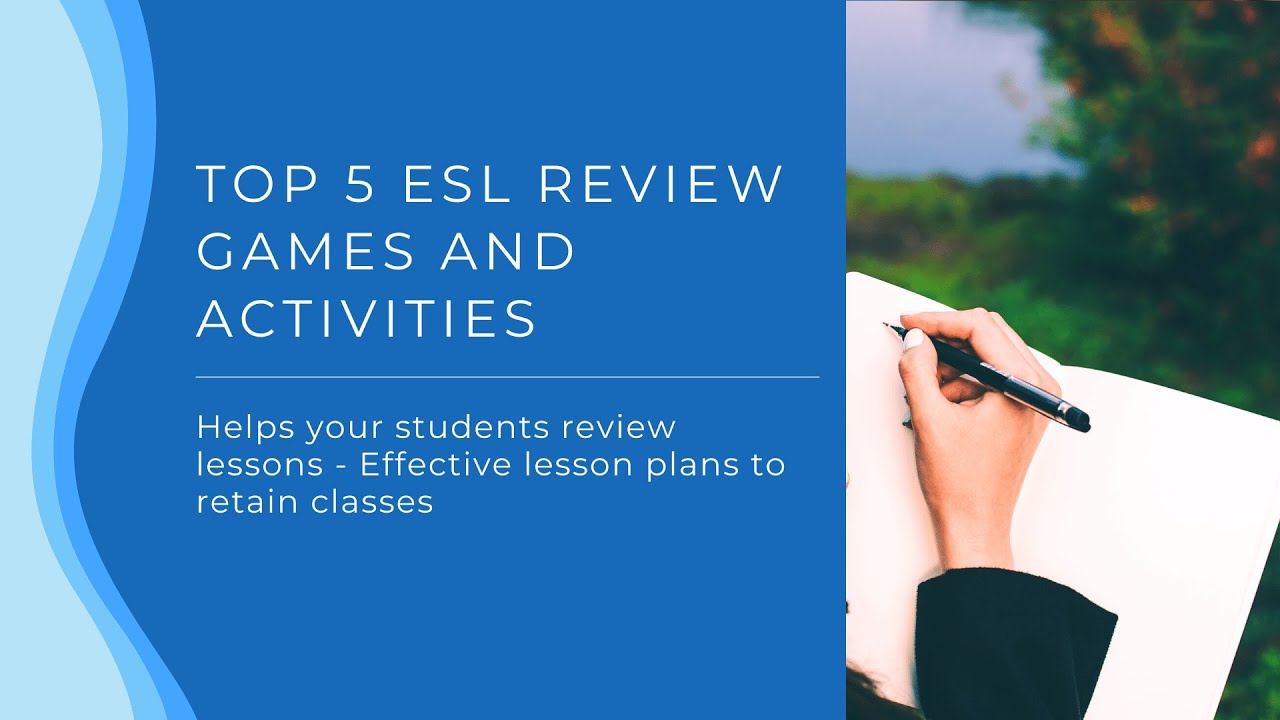
Top 5 ESL Review Games and Activities | Fun English Review G...
31K views · Nov 23, 2022 eslactivity.org
If you’re looking to make sure your students understood what you taught them in a previous lesson, consider using an ESL review activity or game! I've compiled my top 5 review activities and games for you to use in your classroom. Review is key in any language class. Students won't remember new vocabulary or grammatical structures until they see them multiple times! That's why I love to review at the end of the class, at the beginning of the next class, at the month's end and then before an exam. Check out the video for my favourite TEFL review ideas. ---------------------- Try out this very fun ESL review game: https://www.youtube.com/watch?v=49gRYbDrqBQ --------------------- Want to find out more about ESL review ideas? Check out: https://www.eslactivity.org/fun-classroom-games/ 39 ESL Review Games & Activities: https://amzn.to/3feSiP0 https://www.facebook.com/eslspeaking https://www.pinterest.ca/eslspeaking/ #review #teachingenglishwithjackie #reviews #eslteacher #englishteacher -------------------- Even more Ideas for the TEFL Classroom: https://eslspeaking.org/ -------------------- Check out more review games from @Pocketful of Primary https://www.youtube.com/watch?v=A7Agy8igabQ -------------------- Timestamp 0:00 Intro 0:08 Board games 0:49 Surveys 1:34 Flashcard sentences 2:03 Dictogloss 2:50 Roleplays 3:39 Conclusion Transcript for ESL review activities: Hi everybody, it's Jackie from eslspeaking.org. Today I'm going to talk about my favourite ESL review games. I love using board games (https://www.youtube.com/watch?v=c2qGOdfoiVk) in my classes. The secret is that it's super easy to make your own to review just about anything. Quite literally almost any grammar point or vocabulary point once you have a little template which I use. You can check it out on my website. The link is below. You can make your own board game in I want to say like 15 minutes. And once you make the simple past board game you'll have it forever. You can just search in Google Drive or whatever. Another good one is should/shouldn't and can/ can't, something like that. So those are all great things to do for board games. The next review game is a survey. So this is where students have a set of questions. For example, maybe the pp (present perfect), have you ever gone skydiving? And then there is a follow-up question that they would do in the simple past. So if you're talking about pp and simple past, this is the obvious thing to do. So a student would have his piece of paper in his hand and then a pencil as well and he would talk and ask a classmate, have you ever gone skydiving? His classmate, yes I have. Then the student would have to ask a follow-up question. When did you go? I went two years ago. All right, the next one is flashcard sentences (https://www.youtube.com/watch?v=gFIbOJklCO8&). This is for kind of absolute beginners as a nice way to review vocabulary or basic grammar as well. If you have a flash card, there's maybe a cat flash card, just show the flash card and absolute beginners could actually just say a cat or it's a cat or something like that. For more advanced students, you could get them to ask questions. Maybe one student picks up the card, see a cat, they ask a question. do you have a cat? Yes, I do. Or, no I don't. The next one is dictogloss (https://www.youtube.com/watch?v=3F-IkZZqvFM&t=2s). This is for slightly more advanced students. It's a listening-focused activity so write up a dialogue, not a dialogue. Well, I don't know, it's not a dialogue. It's just a monologue I guess that has a bunch of the target grammar or vocabulary in it. And then put students into groups of two. They each have a pen and paper. Then read out the dialogue at a faster than normal pace, like quite a quick pace. Students have to take notes and then talk with their partners and attempt to recreate what they've heard. They can do this either by writing or speaking. It's really up to you. Then read it out again. Students kind of add more to what they have and then they can compare their version with the teacher's version in the end. The last review game that I like is role-plays. So if you're talking about a bunch of vocabulary, there are some vocabulary that lends themselves super well to role-plays. Things like buying, shopping at the store. For example, you're talking about money, you're talking about maybe clothes, whatever. Have students make up a little role play of going to the store and talking about buying something, talking about money, etc. Another one is maybe someone sees their friend and they're not feeling well so they're asking questions about that. Or, maybe some functional language like someone has to cancel an appointment with a friend. You can maybe do a little phone call role play to do that. So that works for just about anything quite honestly for beginners. Those are my favourite ESL review games to try out with your students!
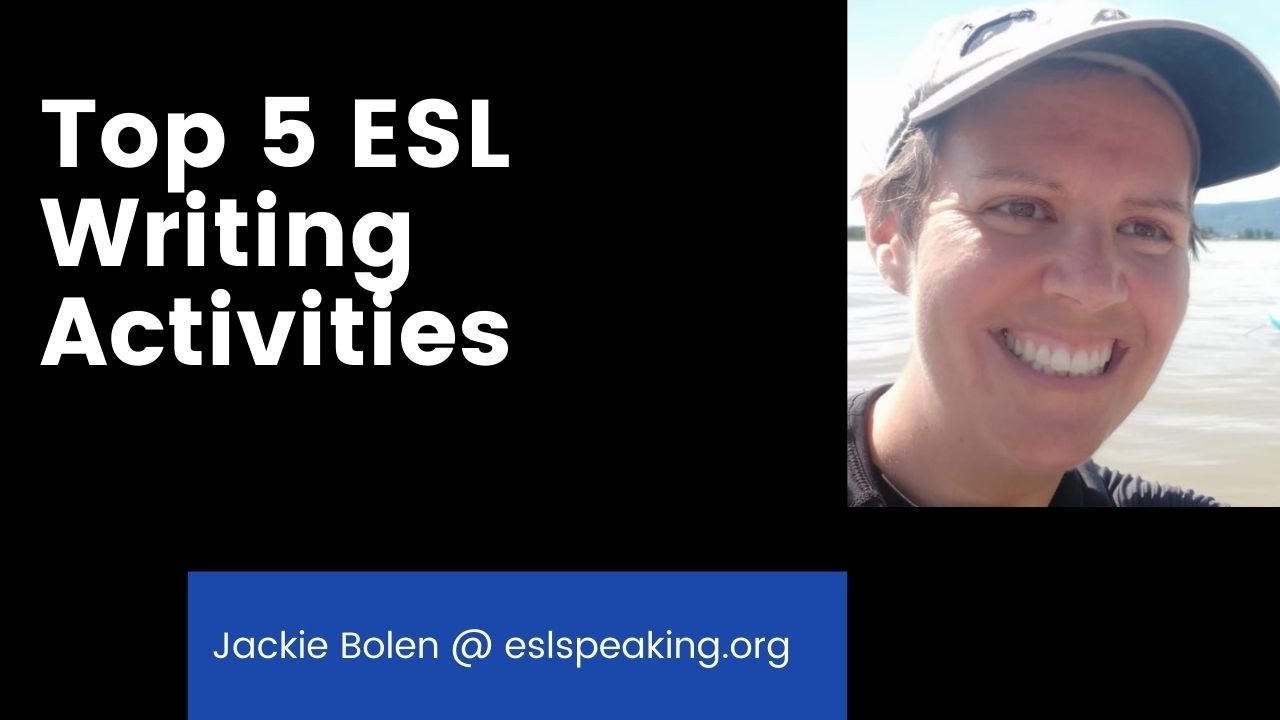
Top 5 ESL Writing Activities and Games | The Best Ideas for ...
47K views · Nov 23, 2022 eslactivity.org
Do you teach ESL writing? Then you're definitely in the right place. Check out the best ESL writing games and activities, along with lots of other great ideas for English writing lessons and classes. Have some fun with these ESL writing exercises that'll work for any level. Teaching English writing doesn't have to be super difficult if you have some fun ideas for lesson plans in your back pocket. Watch the video for the top ideas for EFL/ESL writing activities. Want to find out more about teaching English writing? Check out: https://www.eslactivity.org/esl-writing/ ESL Writing, Activities and Games (on Amazon): https://amzn.to/33DBlZg https://www.facebook.com/eslspeaking https://www.pinterest.ca/eslspeaking/ #englishwriting #teachingenglishwithjackie #eslteacher #eslteaching #teachingenglishabroad -------------- Even more Ideas for the TEFL Classroom: https://eslspeaking.org/ -------------- Fun ESL writing activities from @Tasnim Salah https://www.youtube.com/watch?v=NCzn5yk0qNk ------------- Timestamp 0:00 Intro 0:07 3 things 0:26 Journaling 0:49 Postcards 1:15 Dictogloss 1:45 Application form 2:17 Conclusion Transcript for top 5 TEFL writing activities: Hey everybody, this is Jackie from eslspeaking.org. Today, I'm going to talk about my top five ESL writing activities. The first one is three things. This is a quick warm-up activity. Just put students into pairs and each person writes down three nouns. They change papers and then the other person has to write a quick little story about the nouns. It can be quite silly or funny, serious, I don't know. It is whatever the students make it but it's a nice warm-up activity. The next one is journaling. So I like to get my students not always doing super serious writing. Journaling is a nice way to get students to work on fluency. You can do it for homework or do it at the beginning of each writing class. The goal is just for students to write quickly without necessarily editing or filtering what they write. The next one is postcards (https://www.youtube.com/watch?v=phyFQAFMZUM). So this is kind of a fun group writing activity if you can get your hands on some blank postcards for pretty cheap. Put students into groups and they need to come up with a place that they all went to and then they can write a postcard to their teacher or their grandma or something like that, talking about what they ate, what they did, etc. Display them around the class and have students present their postcards to the class and talk about the pretend trip that they took. The next one is dictogloss (https://www.youtube.com/watch?v=3F-IkZZqvFM). So this is an activity for higher-level students. Find a passage or write one yourself that covers the key grammar or vocabulary that you want to cover and then put students into pairs and read it out at a faster than normal pace. Students take notes and then compare what they have with their partners. Repeat the process and then students can write out their final version of what they think they heard and then they can compare what they have with the original version in the end. The last one is an application form. When i did the CELTA, my tutor told me that writing is more than a formal academic essay and of course, it is but that's always what I thought so I'd feel overwhelmed about teaching writing to beginners. But a nice activity, kind of for high beginner or intermediate level students is to print out some application forms and then have students fill them out. It's a different set of vocabulary and it's also a very practical skill if you're teaching in an English-speaking country or to students who are planning on going to an English-speaking country. That's it. Those are my top five ESL writing activities. If you like this video, please hit like, subscribe, and tell your friends. Also, be sure to check out the blog post with lots more ESL writing activities.
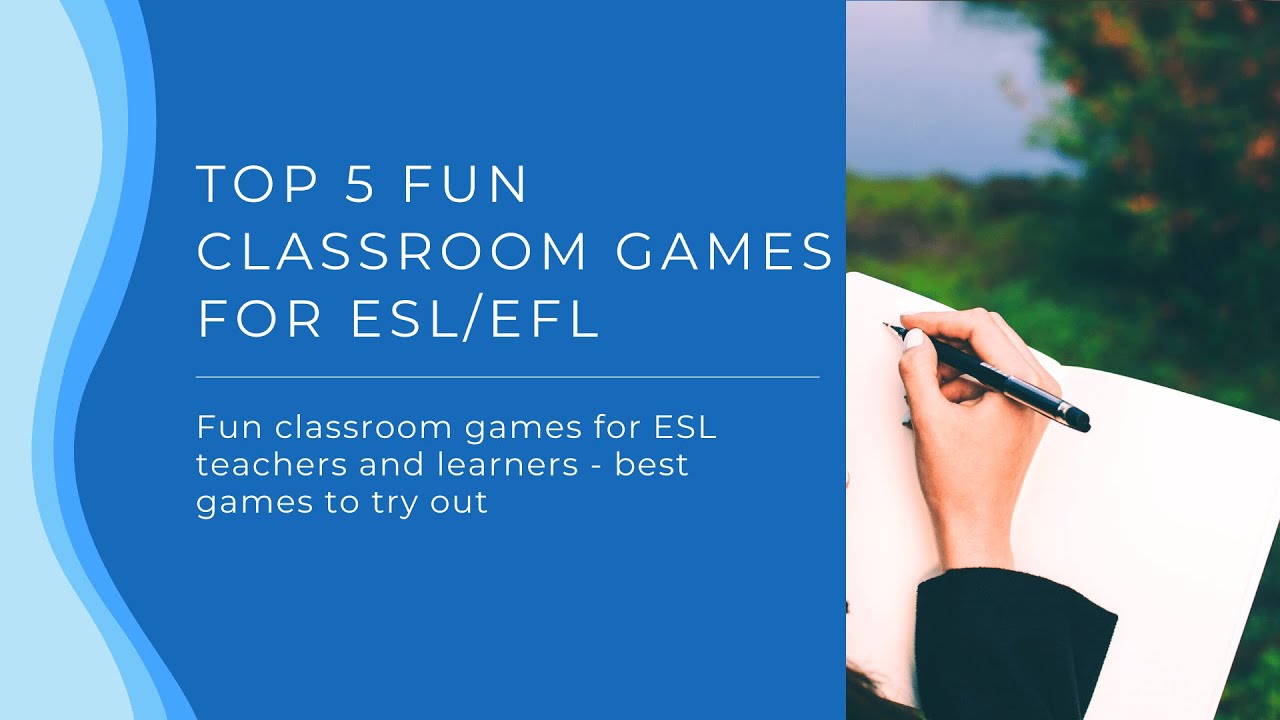
Top 5 Fun Classroom Games for ESL/EFL | Games to Play in Eng...
34K views · Nov 23, 2022 eslactivity.org
If you’re looking to create some fun and excitement in your classes, then consider these fun classroom games for ESL/EFL. This video will get you started with awesome and fun English games to try out with students! Watch along, and comment - what do you think of these games? Would you suggest any other ESL or EFL games and activities to excite your classroom? Help your students learn English in a fun, student-centred, and engaging way with these classroom games for kids, teenagers or adults. Need more ideas to have some fun in the TEFL classroom? You'll want to check out even more of the best ideas right here: https://www.eslactivity.org/fun-classroom-games/ ---------------------------- More fun ideas for young learners: https://www.youtube.com/watch?v=wMaxTc1StFM& ----------------------------- Want to find out more about fun classroom games? 101 ESL Activities for Adults: https://amzn.to/2QEqH1B https://www.facebook.com/eslspeaking https://www.pinterest.ca/eslspeaking/ https://www.tiktok.com/@englishwithjackie?lang=en #eslgames #teachingenglishwithjackie #teachingenglish #teachingenglishabroad #eslteacher -------------------------------- Solid advice for teaching ESL: https://eslspeaking.org/ -------------------------------- More ideas for fun ESL games from @Andy - The ESL Guy https://www.youtube.com/watch?v=7Si6SJUOj4c&t=1s -------------------------------- Timestamp 0:00 Intro 0:13 Concentration 1:03 Mystery box 1:37 A-Z game 2:37 Odd one out 3:05 Twenty questions 4:09 Conclusion Transcript for fun ESL games and activities: Hi everybody. It's Jackie from eslspeaking.org. So today it's all about the top five fun classroom games. This is for English learners or ESL or EFL classes. The first game is concentration. This is excellent for helping students remember new vocabulary words. Make up some sets of cards. So for example, there's maybe, if you do animals, there's a picture of an elephant, a tiger, cheetah. And then on the other card, you have the words elephant, tiger, cheetah. Put students into groups of maybe three to five and each group would get a set of cards. They mix them up and place them face down kind of in an organized fashion on one of the desks. They can do rocks, scissors, paper. The first student grabs two cards. They turn them over: tiger picture but elephant word. Not a match so they put them down in the same spot. They do not mix them up randomly but in the same spot and then the next student goes. It's basically just kind of a memory matching game that focuses on vocabulary. All right, the next one is the mystery box. So this is a great game for kids who are just learning some very basic words. For example, classroom vocabulary. Make up kind of a fun box with a hole in it and you can cover the hole with some tissue paper or I don't know, just something, whatever to kind of cover it loosely. One student can reach their hand in and they can feel around and maybe make some guesses about what kind of objects are in there, how they feel, are they hard, soft, long, thin, thick, heavy, light, etc. Number three, is the A to z game (https://www.youtube.com/watch?v=gQ8UuOQEuWM). So this is a nice activity if you think that students have already covered that topic that you're teaching that day quite well. It can help them to activate their prior knowledge about vocabulary words. So let's use the example of animals again. I put students into groups of two or three and I have them write the alphabet on a piece of paper so a, b, c, d, all the way to z. If you want to save time, you could just give a handout that has done this already. And then I say okay, you have two minutes to write down as many animals as you can. One per letter. So for example, maybe they don't know an a, they could skip it. Then bat, cat, dog, fish, monkey, tiger, etc. After the two minutes, the team with the most animals is the winner. Number four is odd one out (https://www.youtube.com/watch?v=80vtLosY1JA). So this is a simple warm-up activity to work on critical thinking skills and also vocabulary. Write down four words on the board. Here's a very simple example: apple orange banana carrot. I put students into groups of two and they have to say which one is the odd one out and why. For this one, the obvious thing is a carrot because it's a vegetable and not a fruit. Number five is 20 questions (https://www.youtube.com/watch?v=8Q0Osbuh8yg). This is a classic game that you've probably played before but it's also quite fun to play in English classes. For lower-level students, it can be a little bit tricky. I sometimes make it into 10 questions and it's more related to a certain topic. For example, animals. If you want to kind of prevent the one student from choosing platypus or t-rex or just something kind of like the other students may not know or would never guess you can give flash cards. And whoever holds the secret and is answering the questions, has to do it with that flashcard.
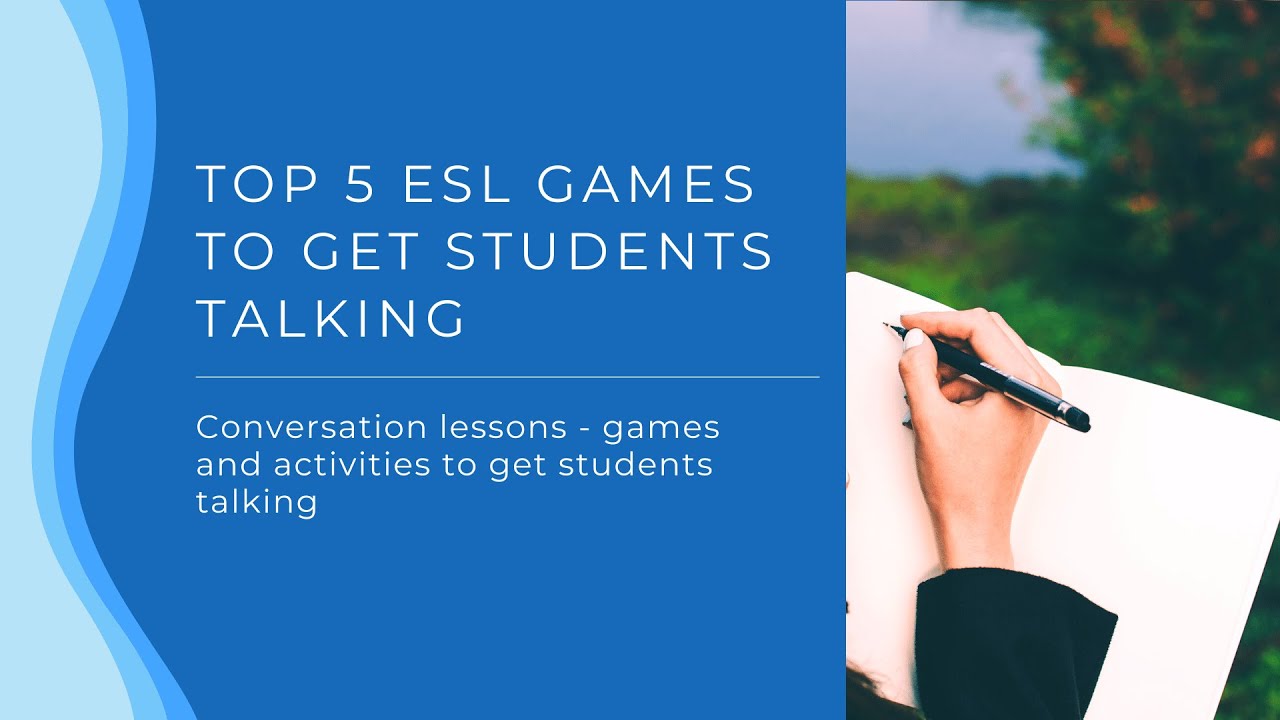
Top 5 ESL Games to Get Students Talking | Make TEFL Conversa...
24K views · Nov 23, 2022 eslactivity.org
Many of our students say they want to practice their conversation skills. You can use these English conversation activities to help them do just that and to work on speaking more fluently at the same time. These ESL conversation games and activities are interactive, engaging, and student-centred. Try out some fun ESL speaking games today. Watch this video for tips and games on how to incorporate ESL games into your classroom to get your students excited about learning! Check out the blog post after for some more great ideas for getting your students talking in English class. Even more ESL convo games and activities here: https://www.eslactivity.org/top-7-english-conversation-activities-for-adults/ --------------------------- Even more fun ideas for teaching English: https://www.youtube.com/watch?v=wMaxTc1StFM& ----------------------------- Want to find out more about teaching ESL speaking and conversation? 101 ESL Activities for Adults: https://amzn.to/2QEqH1B https://www.facebook.com/eslspeaking https://www.pinterest.ca/eslspeaking/ https://www.tiktok.com/@englishwithjackie?lang=en #teachingenglishwithjackie #teachingenglish #eslteachers #eslgames #eslactivities --------------------------- More fun ideas for the TEFL classroom: https://eslspeaking.org/ -------------------------- Even more ESL speaking activities from @Charlie's Lessons https://www.youtube.com/watch?v=7LFXdmHkUvE&t=4s ------------------------- Timestamp 0:00 Intro 0:08 Just a minute 0:50 Information gap activities 1:14 Getting to know you bingo 1:52 Debate 2:25 Find something in common 3:10 Conclusion Transcript for ESL conversation activities and games: This is jackie from eslspeaking.org. So let's talk about the top five ESL games to get students talking. The first one is just a minute (https://www.youtube.com/watch?v=wnJOTGxaN9w&t=1s). Put students into groups of four and then number them: one, two, three, four. Write a bunch of topics on the board: hobbies, family, sports, movies, TV, whatever. You can even get students to shout out things that they want to talk about. Scrunch up a paper ball and throw it at the board. It'll hit one of the words or come close to one of the words. Then the first person in each of the groups has to talk about that topic for one minute without stopping. The other three people in the group have to listen and then ask a follow-up question related to what they said and then continue with numbers two, three, and four. The challenge of this game is to talk for the entire minute and then also to ask an interesting and relevant follow-up question. Number two: information gap activities and games (https://www.youtube.com/watch?v=quJnHU7HWCA). These get students talking because each student has half the information and they have to interact with each other to get the full set. For example, a classic one would be a map with different locations on each map and students have to ask, "What's next to the bank?" or, "What's across the street from the school?" and then fill in the blanks on their paper. Alright, number three is getting to know you bingo. So I have students fill in their cards with things that they think some people but not everybody in the class will be able to say yes to. For example, has a brother, grew up in the city where your school is, likes pepperoni pizza, is a vegan, etc., whatever. For lower-level students, you could give a list of things already. Higher-level students, you can give some examples and then they can fill in the card themselves. After that they have to circulate around the class, asking their classmates questions and the goal is to get maybe a line or to cover all the squares, whatever you decide you want that to be. Number four is a debate. I like to do very simple debate debates. I choose a controversial topic and I ask who disagrees, and who agrees. Ideally, it's kind of an even match and then those two students will get together: one agrees, one disagrees and have a little debate. And then I will get each group if it's a small class to summarize kind of what they talked about in the main points. So there are a ton of different ways you could do this and you could even do it as an entire class activity if you wanted. Then finally the last game to get people talking is to find something in common. This is an excellent icebreaker activity to do on the first day of class. Each student has to stand up with a pen and paper and they have to circulate around the class, talking to as many classmates as possible, asking them questions and the goal is to find something in common with that person. For example, do you play the piano? Or, do you play a musical instrument? What kind of sports do you like? What's your favourite food? How long have you studied English? What's your hometown? etc. Once they find that thing that they have in common, they can write down that person's name and then also just a quick note about what's in common.
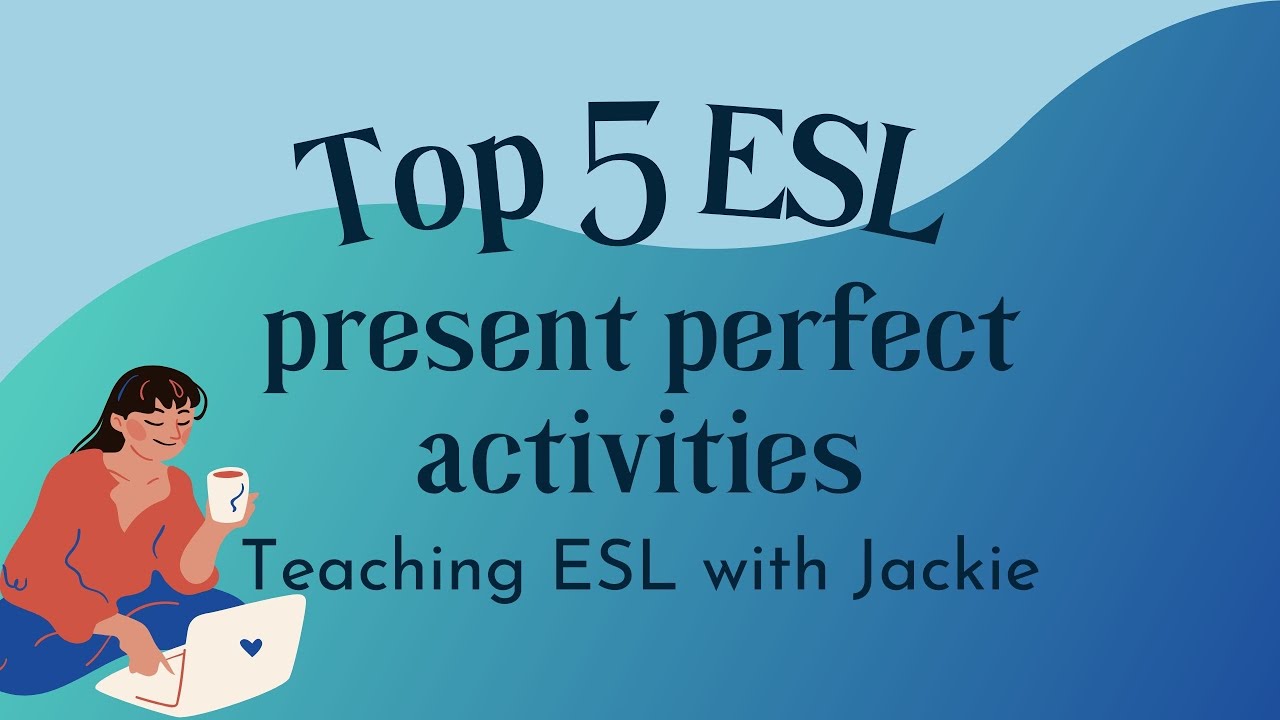
Top 5 ESL present perfect activities | Games and activities ...
8K views · Nov 23, 2022 eslactivity.org
Want more information about Present Perfect Activities? Check out this blog post which contains more information, including some present perfect examples: https://www.eslactivity.org/esl-present-perfect/ Are you looking for some ESL present perfect games and activities to try out with your students today? Then you’re most definitely in the right place. Keep on watching for our top five p.p. activities for English learners, along with some present perfect questions and a quick primer on what the present perfect actually is. We have a separate video explaining the Present Perfect Tense is right here: https://youtu.be/ntSosNLL3SU Want to find 39 No-Prep/Low-Prep ESL Grammar Activities for Adults? Check out my book: hhttps://amzn.to/3sPqMiP https://www.facebook.com/eslspeaking https://www.pinterest.ca/eslspeaking/ https://www.instagram.com/jackie.bolen/ https://www.tiktok.com/@englishwithjackie?lang=en #esl #teachingEnglish #teachingenglishwithjackie #presentperfecttense Timestamp 0:00 Intro 0:13 Present perfect examples 0:40 Surveys 1:18 Board games 1:54 Dictation 2:22 Timelines 2:47 Dialogue substitution 3:19 Conclusion Transcript for ESL present perfect games and activites: Hi everybody, this is Jackie from eslactivity.org. So today I'm going to talk about the top five ESL present perfect activities. Some examples of the present perfect are: I've gone bungee jumping. That means I went bungee jumping at some time in the past but the time is unknown. You can also use it to describe something that began in the past and continues until now. For example, she studied for hours. She started studying at some time in the past and is still studying until the present. All right, so here are the top five ESL present perfect activities you can try out with your students. Okay, so the first activity that you can use are surveys. This is the ultimate way to combine the present perfect with the simple past. You can fill up your survey sheet with present perfect questions. Have you been bungy jumping? Have you read Harry Potter? That kind of thing. Then students will ask their classmates and if a student says yes, yes I have been bungee jumping, the student can switch to a follow-up question in the simple past. When did you go bungee jumping? Oh, I went bungee jumping last year, and then I get students to take some very brief notes, just with a name and then their follow-up answer. The second activity for the present perfect is board games. You can fill up your board game grid with some special squares like go back, to trade places with the person on your left, have a rest, etc. but the rest of the squares you can fill up with present perfect questions. When a student lands on that square they have to answer that question and then give one follow-up detail. So for example, Have you been bungee jumping? Yes, I have. I went last year or if they answer no, I haven't then they could say something like but I'm interested in going, or wow that sounds really scary, I never want to go bungee jumping, something like that. The third one is dictation. So dictation I know is a little bit of an old-school activity but it actually has a lot of value. I would simply say the question, Have you been bungee jumping? Students have to write it down in their notebooks and then they can answer the question with yes I have, or no I haven't. Conversely, you could give some answers, yes I have no I haven't, and students write them down and then they can make up a true question for themselves. The fourth activity is timelines. This isn't really necessarily an activity, however, it's really useful for explaining the present perfect. So we use it for two situations to describe an indefinite time in the past: I've been bungee jumping or something that began in the past and continues up until the present. So I love using timelines to kind of explain the subtle difference between those two things and then how to actually use the present perfect. The fifth one is dialogue substitution. So maybe your students are kind of like mine and if I give them a dialogue to read with a partner, you can often find them in the textbooks the students just kind of blow through them and they don't actually pay any attention to what they've read. So I'll say something like, has bob been bungy jumping? I don't know! But they just read a whole dialogue about it so the way that I kind of combat this is I remove some of the key words from the dialogue. -------- Tags: esl, teaching esl, English, learning English, English teacher, classroom tips, TEFL, efl, tefl, teaching English, teaching teenagers English, teaching kids English, easy lesson plan, simple lesson plan, esl ideas, games for everyone, Study, study tips, TEFL Game, TEFL activity, Learning games, Learning activity, Present perfect
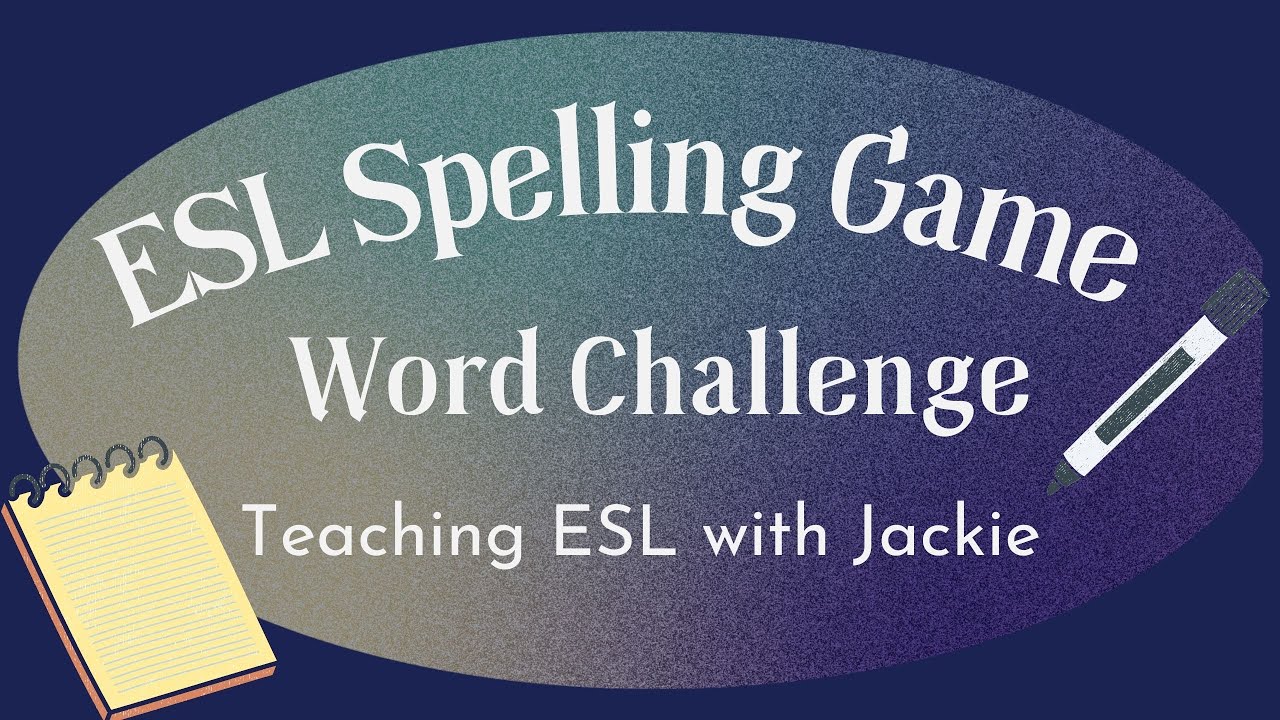
Word Challenge Whiteboard Race: A Simple TEFL Writing Activi...
12K views · Nov 23, 2022 eslactivity.org
Blog post for this Word Challenge Whiteboard Race: https://www.eslactivity.org/esl-spelling-game/ I’m ALL about activities that require basically nothing in the way of materials or preparation time. It’s ideal to have at least a few of them in your back pocket to pull out in case of emergency, namely a last-minute class thrown at you a few minutes before it starts. This word challenge whiteboard race is one such example, so watch the full video for all the details Want to find more ESL Writing Activities, Games & Teaching Tips besides this word challenge activity? Check out my book: https://amzn.to/3uAchAM https://www.facebook.com/eslspeaking https://www.pinterest.ca/eslspeaking/ https://www.instagram.com/jackie.bolen/ https://www.tiktok.com/@englishwithjackie?lang=en #esl #teachingEnglish Transcript: Hi this is jackie from esl speaking.org. Today I'm going to talk about a very simple game called word challenge. It's basically an esl spelling game. I love activities that require nothing in the way of preparation and then also nothing in the way of materials. These are some of the best activities to have if you kind of have this emergency class that's thrown at you or you have a few extra minutes to kill and you finished all the things that you had on your lesson plan. This is kind of a nice one to do. So the way it works is that you can have a word list of vocabulary words that you've recently taught your students or for the no-prep version just kind of come up with them on the fly. It depends how good you are at that i personally prefer to have a list coming up with things on the fly is possible but I get kind of stressed out about it so I definitely prefer to have a list and then put students into teams so the number of teams will depend on how much whiteboard space you have. So if you have quite a big whiteboard you might want to have like three or four different teams because everyone needs to line up in a section. If you have say four teams of four you can draw lines, three lines down the board and each team gets one section of the whiteboard and then the first person at the board, one person from each team will take a marker and line up and then their three teammates will be behind them. Then the teacher says a word and the first student to spell that word correctly gets one point for their team. I usually make a rule that the people behind them are not allowed to talk to them. If the people behind them can give hints it gets really crazy really really quickly, Everyone is yelling and screaming and just like it's kind of a lot so it's quite exciting to do it that way but I personally prefer just having quiet and then the students of the board can race and do it when you're done that the winner gets a point. Then the next person in line goes and that first person goes to the back of the line. All right if you like this activity please be sure to check out my book, ESL Writing Games and Activities. Also hit like, subscribe, and I'll catch you next time. Tags: esl, teaching esl, english, learning english, english teacher, learning language, ESL kids, TEFL classroom, classroom tips, TEFL, efl, tefl, teaching English, teaching teenagers english, teaching kids english, TESOL, no prep activity, low prep activity, low prep games, no prep games, no prep lessons, low prep lessons, easy lesson plan, simple lesson plan, esl writing activity, esl writing, writing ideas, writing activity, writing game, esl ideas, games for everyone, Writing prompt, Word Challenge, Whiteboard game, Whiteboard race, TEFL writing, Simple activities,
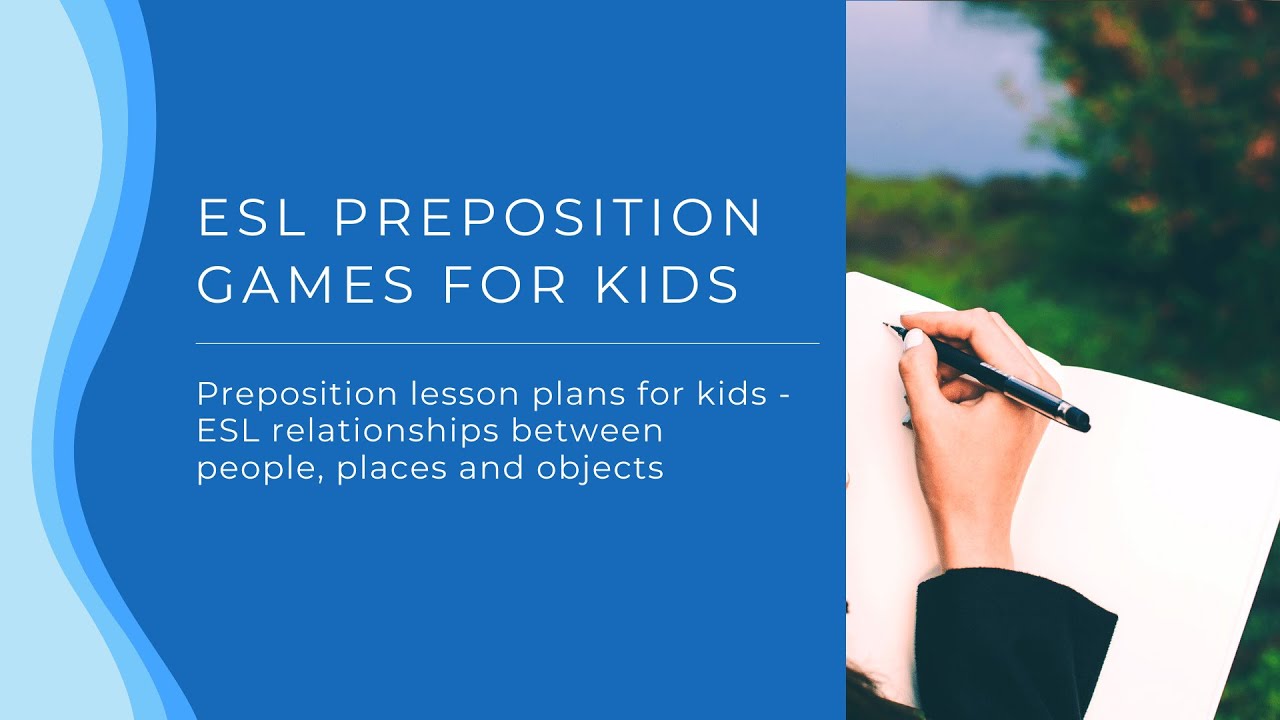
ESL Preposition Games for Kids | TEFL Prepositions of Place ...
26K views · Nov 23, 2022 eslactivity.org
If you're looking for some fun ESL preposition games and activities for kids, you're in the right place. Watch the video for some of my favourite prepositions of place ideas for English lessons. When teaching ESL students, you can explain that prepositions are used to show relationships between places, people and objects. Some of the most common ones are: in, at, on, out of, onto, etc. Check out the video and my blog post for more preposition ideas for children for the classroom! It's teaching prepositions of place to kids made easy! ----------------------- Try out this prepositions of place online memory quiz with your students: https://www.youtube.com/watch?v=qhkQCSZuE0g ----------------------- Want to find out more about teaching English to kids, including prepositions? Check out: https://www.eslactivity.org/preposition-place-games/ 101 ESL Activities for Kids: https://amzn.to/2QEqH1B https://www.facebook.com/eslspeaking https://www.pinterest.ca/eslspeaking/ #preposition #teachingenglishwithjackie #prepositions #teachingenglish #esl -------------------------------- Even more Ideas for the TEFL Classroom: https://eslspeaking.org/ ------------------------------ Another fun preposition game for kids from @English Teaching Games https://www.youtube.com/watch?v=DbeodiPerlM ------------------------------ Timestamp 0:00 Intro 0:16 Preposition memory game 0:58 Is that sentence correct? 1:23 Information gap activities 1:51 Concentration 2:27 Picture prompt 2:54 Conclusion Transcript for prepositions of place ESL games for kids: Hi everybody, this is Jackie from eslspeaking.org. Today I'm going to talk about the top five ESL prepositions of place games and activities for kids. Prepositions are things like in, on, under, beside, and next to. There are a whole bunch of them. The first one I like to do is a memory game. I flash up a picture on the screen with various objects that would lead to preposition usage. I give students maybe one to two minutes to study the picture. I don't let them take notes and then at the end of the minute, I take down the image and I ask questions. For example, where's the ball? And the students would have to write, the ball is on the desk or something like that, for example. You can adapt it based on the level of your students. For lower level, you could just say, is the ball on the desk or under the desk? And students can just write on or under. Just one word. Higher-level students can write the entire sentence quite easily. The next one: is that sentence correct. This is similar in that there's an image on the screen and then I ask students questions. For example, is the boy next to his mom? Yes, he is. Or, no he isn't. Or, where is the ball? They could write the ball is on the desk, something like that. This isn't a memory game so it's a little bit easier than the previous one. The next one-information gap activities (https://www.youtube.com/watch?v=quJnHU7HWCA&t=32s). They are perfect for prepositions of place. This is when one student has half the information, and the other student has the other. The classic one is that there is a city map and this student has the bank and the fire hall and the school and the bakery and they have to talk to each other to find out the complete set of information and write it all down. They'd have to ask questions like, where's the bank? Where's the school? The school's next to the bank, etc. Things like that. The next one is concentration. So this is a really good one for beginners. Write down the word in and then show a picture of something in. And then on, plus a picture of something on. Cut up the cards, and put students into groups of four. They arrange them on their desks in an organized fashion, maybe about 12 to 16 of them. Four students in a group. The first student uncovers two cards. If they match, they keep it. If they don't match, they put them back in the same spot and then the next student goes. Continue on until all the cards are gone. You can mix it up and even play again if you want as well. The next one is picture prompt (https://www.youtube.com/watch?v=5dPDFKzCVj8). So this is a really nice warm-up one to introduce prepositions of place. Flash up a picture on the screen that leads to preposition usage and then just ask some leading questions like, where's the boy? He's in the park. Who is he with? He's with his mom. Why is he always next to his mom? Okay, so you can just ask questions like that to elicit the target information that you want. That's it for prepositions of place activities for kids.
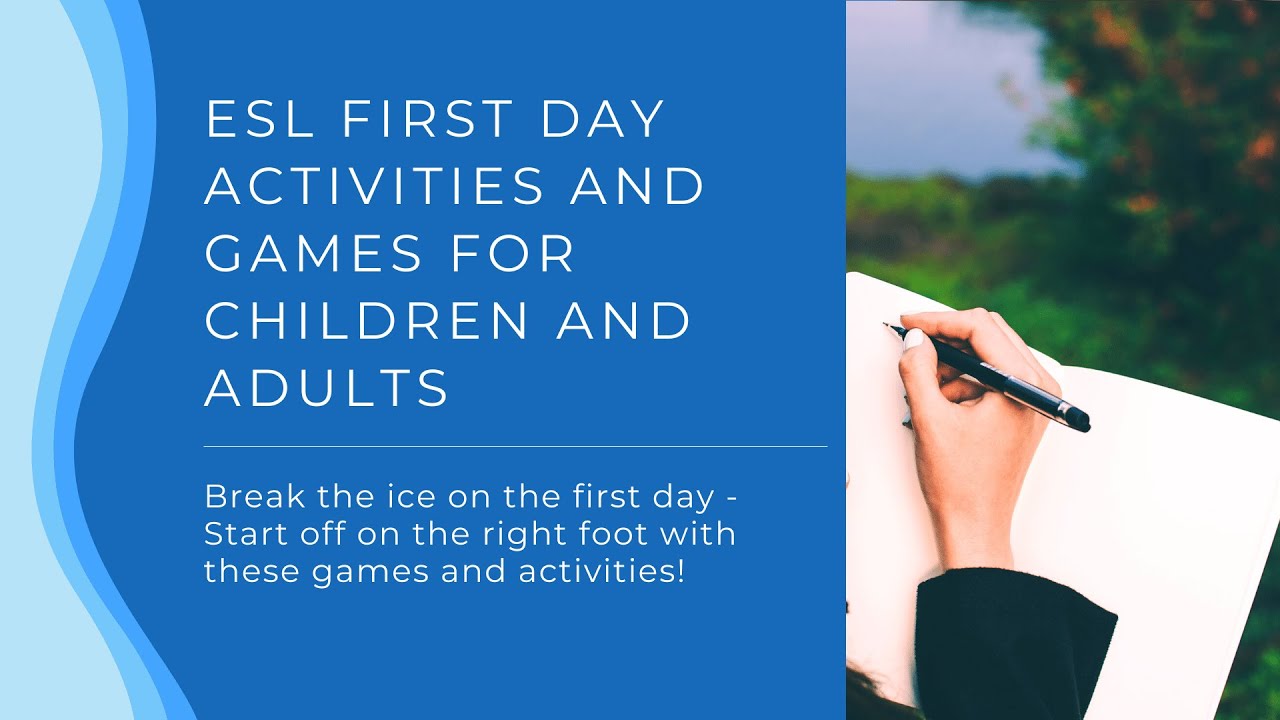
ESL First day Activities and Games for Children and Adults |...
51K views · Nov 23, 2022 eslactivity.org
The first day classroom jitters can be intimidating and are certainly a real thing! There are ways to help though, and I'm here to give you some ideas for ESL first-day activities and games! Here are some games and activities for your first day back in the classroom. Have some fun with these icebreaker activities for language learners! ------------------ Even more ideas for the first ESL lesson: https://www.youtube.com/watch?v=LuTHvTPX5R8&t=1s ----------------- Want to find out more about activities and games for the first day of class? Check out: https://www.eslactivity.org/esl-activities-for-first-day/ 39 ESL Icebreakers: https://amzn.to/3fhiZD4 https://www.facebook.com/eslspeaking https://www.pinterest.ca/eslspeaking/ #icebreaker #teachingenglishwithjackie #icebreakers #teachingenglish #eslgames ------------ Even more Ideas for the TEFL Classroom: https://eslspeaking.org/ ------------- Even more ideas for the first day from @Etacude English Teachers https://www.youtube.com/watch?v=F8uyfzv1g-c --------------- Timestamp 0:00 Intro 0:20 Ball toss 0:42 Find someone who bingo 1:16 Toilet paper icebreaker 1:59 The name game 2:26 Introduction survey 3:11 Conclusion Transcript for TEFL activities for the first day of class: Hey everybody, it's Jackie from eslspeaking.org. Today I'm going to talk about my top five ESL first-day activities. So you all know the first day of any class that you're teaching can be quite stressful. You don't know the students, and the students don't know you but here are some of my best ideas to kind of overcome that and to help break the ice. The first one is ball toss. This is great for a smaller class so get a beach ball and then in permanent marker, write a whole bunch of kind of get-to-know-you questions on the ball. Then you toss the ball from student to student and when they catch the ball, wherever their right thumb is, that's the question that they have to answer. Super simple but it's a fun game to play. The next one is find someone who bingo. So this is just like kind of a regular bingo thing but students fill in their cards with things that they might ask their classmates to get to know them. Like, who has a pet, who's 21 years old, who grew up in Vancouver, etc. So you can have a list of possible choices and students can fill it out. Or you can get students, advanced-level students, to make up their own cards. Then they circulate around the class, talking to their classmates and trying to get one line or the whole grid or however you want to play it. The next one is the toilet paper game. So bring in a roll of toilet paper or some candies, wrapped candies are also fine. And then tell students they can take a certain number. They can take, I usually say between four and six pieces of toilet paper and then I put students into small groups of three or four and they have to say one fact about themselves to their group. And then they throw away one piece of toilet paper, or they can eat one of their candies or save it for later if they don't want it then. Of course, put it in their backpack or whatever. Then the people listening, one person can ask a follow-up question based on what they heard and then they also can get rid of one of their candies or pieces of toilet paper. The next one is the name game. So this is a really simple one for absolute beginners. it's like a memory circle game. So the first person says, my name is Jackie and I like cats. The second person says, my name is Ted and I like pizza. Her name is Jackie and she likes cats. Continue on and usually, I'll do it so the teacher goes last so it's a bit challenging. So pay attention! The last one is an introduction survey. This is really good for more advanced level students and this is often what I did in my university classes in South Korea. I make up a survey with a bunch of common questions that I think some students but not all the students will say yes to. So for example, has a brother, who is in his or her second year, grew up in a certain neighbourhood, has gone skydiving, etc. Students have to circulate around the class, finding people who will answer yes to each question once they find that person they ask a follow-up question and then they write the name of the person and then a little bit about the follow-up. For example, do you have a brother? Yes, I do. So they could write Jackie. Then their follow-up question might be, What's your brother's name? His name is Keith. They could write Keith in the blank. So that's it for my ESL first-day activities.